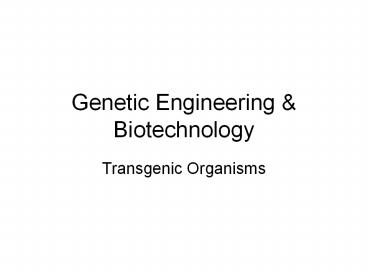Genetic Engineering - PowerPoint PPT Presentation
Title:
Genetic Engineering
Description:
Genetic Engineering & Biotechnology Transgenic Organisms Genetic Engineering Transformation: introduction of a new gene from one organism into another organism (often ... – PowerPoint PPT presentation
Number of Views:151
Avg rating:3.0/5.0
Title: Genetic Engineering
1
Genetic Engineering Biotechnology
- Transgenic Organisms
2
Genetic Engineering
- Transformation introduction of a new gene from
one organism into another organism (often across
species) - Transgenic organisms are created through the
addition of new genes or the suppression of
existing genes.
3
Luciferin Luciferase Genes
4
Golden Rice A cure for Vitamin A Deficiency and
Nutritionally-Induced Blindness?
5
Golden rice vs. White Rice
6
GloFish Zebra fish coral genes
7
Cloned Animals To perpetuate transgenic
varieties and other special animals
Cc the Cat 2002 -
Dolly the Sheep1996 - 2003
8
Snuppy the Cloned Dog
- a, Snuppy, the first cloned dog, at 67 days after
birth (right), with the three-year-old male
Afghan hound (left) whose somatic skin cells were
used to clone him. Snuppy is genetically
identical to the donor Afghan hound. b, Snuppy
(left) was implanted as an early embryo into a
surrogate mother, the yellow Labrador retriever
on the right, and raised by her. - a, Snuppy, the first cloned dog, at 67 days after
birth (right), with the three-year-old male
Afghan hound (left) whose somatic skin cells were
used to clone him. Snuppy is genetically
identical to the donor Afghan hound. b, Snuppy
(left) was implanted as an early embryo into a
surrogate mother, the yellow Labrador retriever
on the right, and raised by her. - p641 Lee BC, Kim MK, Jang G, Oh HJ, Yuda F, Kim
HJ, Shamim MH, Kim JJ, Kang SK, Schatten G, Hwang
WS (2005) Dogs cloned from adult somatic cells.
Nature 436(7051)641. - http//pharyngula.org/index/weblog/comments/snuppy
_the_cloned_puppy/
9
Potential benefits of transgenic organisms (GMOs
- Genetically-modified organisms)
- Genetic engineering can produce organisms that
are - able to synthesize oils, starches, hormones
(e.g., bacteria that produce human insulin for
use by diabetics) and plastics - edible vaccines from vegetables and milk
- able to synthesize enzymes for food processing
and other uses - more nutritious foods (e.g., plants with a higher
protein content, and wider profile of essential
amino acids - methionine-rich beans or
lysine-rich corn golden rice to help enrich the
diets of those not able to eat foods rich in
beta-carotene or Vitamin A to prevent blindness
caused by a nutritional deficiency) - plants able to fix their own nitrogen for growth
- freeze resistant plants
- pest resistant plants
- herbicide resistant plants
- disease resistance in animals and plants
- gene therapy to help cure certain diseases linked
to the under or over abundance of a protein
product by a genetic disorder
10
Potential problems of transgenic organisms (GMOs
- Genetically-modified organisms)
- Allergies to transformed plant and animal
products. - Accidental movement of novel genes into wild
relatives from domesticated plants and animals. - Consumer resistance to using genetically-modified
products, especially food and drugs. - Ethical and moral considerations. (e.g.,
exploitation of genetic resources for personal
gain).































